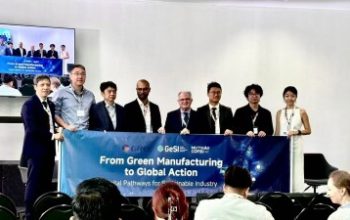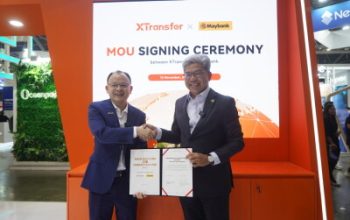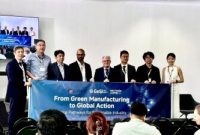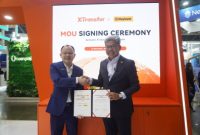Industry’s first AI powered end-to-end decarbonization software solution receives recognition from the United Nations Global Compact Network Singapore
SINGAPORE – Media OutReach Newswire – 10 October 2024 – Univers, the global decarbonization software leader headquartered in Singapore, is pleased to showcase the capabilities of EnOS™ Ark (‘Ark’), an all-in-one enterprise decarbonization Software as a Service (SaaS) solution that provides comprehensive, validated data and insights to empower enterprises to take decisive corporate climate action.
Testament to Ark’s capabilities in empowering enterprises to achieve net zero, Univers has been honored with the Sustainable Solutions Award, presented by the United Nations Global Compact Network Singapore (GCNS). The Sustainable Solution Award acknowledges products and services that address sustainability needs for businesses, the environment, and society.
Built using Univers’ proprietary Al operating system EnOSTM, Ark stands out as the industry’s first end-to-end enterprise resource and carbon management solution. It uses a powerful combination of both Artificial Intelligence (AI) and real-time Internet of Things (IoT) data to provide actionable insights for users to achieve quick results for both financials (such as energy savings) and environmental (carbon reduction).
Michael Ding, Global Executive Director, Univers, said, “We are pleased to receive the validation from the UN GCNS, validating EnOSTM Ark’s enterprise decarbonization capabilities that can scale across anywhere in the world and in any building. With EnOSTM Ark, no company, big or small, will be left behind.”
EnOSTM Ark empowers enterprises to:
- Build an accurate emissions footprint: For better data-driven decision-making by tracking in real-time energy, carbon and environmental metrics of both individual assets and enterprise-wide portfolio.
- Streamline asset efficiency management: To improve operational efficiency of disparate assets including heating, ventilation, air conditioning (HVAC) systems, photovoltaic systems, battery energy storage systems, smart grids and electric vehicle charging systems, all on one interface.
- Reduce HVAC electricity consumption: With its AI-HVAC module, machine learning is applied to historical models of building management systems (BMS) for efficiency and optimization.
- Assess portfolio asset health: To ensure high efficiency and uptime for businesses through the monitoring of portfolio asset health through IoT device connectivity and alarms management
- Access built-in carbon credit inventory: To deliver carbon offset accounting in line with international climate disclosure and carbon accounting standards such as GHG Protocol and the Science Based Targets initiative (SBTi).
- Map and implement effective abatement initiatives: To align to the International Performance Measurement and Verification Protocol (IPMVP) methodology, for businesses to determine the most effective abatement initiatives through the greenhouse gas (GHG) emissions datasets across the entire business and its supply chain.
Ark, with Univers’ EnOSTM system and Flex, Storage, Charge and Renewables products, provides customers with a complete end-to-end decarbonization solution that helps them meet net zero.
About Univers
Univers provides the world’s most comprehensive decarbonization system.
We help companies and countries optimize energy systems and reduce carbon emissions with accurate, reliable, and actionable decarbonization data. Our EnOSTM platform connects on-the-ground operational technology and in-the-cloud intelligence to deliver real-time energy data and data-driven carbon monitoring, reporting, and abatement. Univers gives climate leaders unmatched control and opportunity to drive business and environmental progress.
With over 280 million devices connected, more than 685GW of renewable energy under management, and a community of over 800 customers including Antwerp Euroterminal, Bureau Veritas, Certis, PSA International, SITA and more, we’re helping the world’s leading business get the world to net-zero – and what comes after it.

















